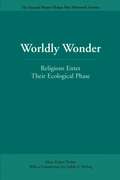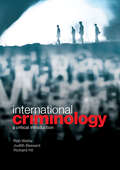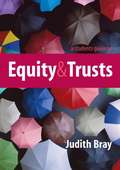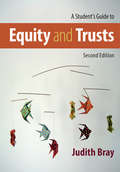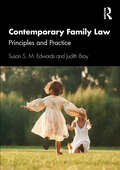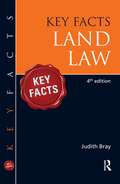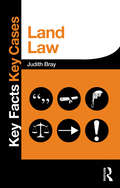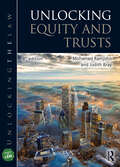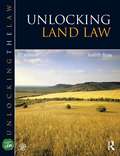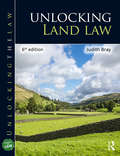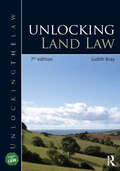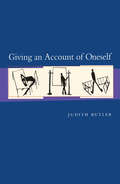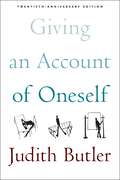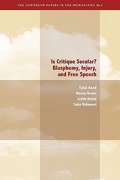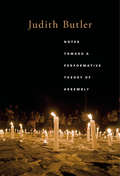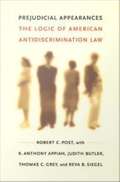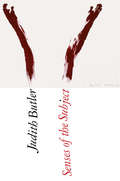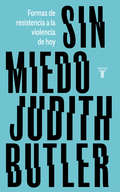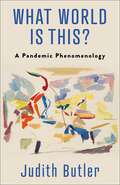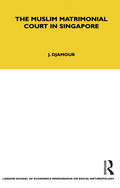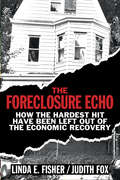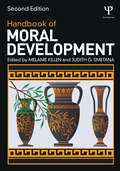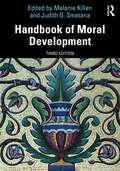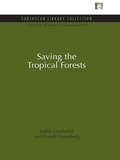- Table View
- List View
American Immigration Today: Pressures, Problems, Policies
by Judith BentleyDiscusses patterns of immigration into the United States and the ethical, political, and economic issues related to American immigration laws and policies.
Worldly Wonder
by Mary Evelyn Tucker Judith BerlingHistory illustrates the power of religion to bring about change. Mary Evelyn Tucker describes how world religions have begun to move from a focus on God-human and human-human relations to encompass human-earth relations. She argues that, in light of the environmental crisis, religion should move from isolated orthodoxy to interrelated dialogue and use its authority for liberation rather than oppression.
International Criminology: A Critical Introduction
by Rob Watts Judith Bessant Richard HilInternational Criminology is an easy-access critical introduction to how conventional criminologists in the international arena think about and research crime. By using examples from the US, UK and Australia, the authors outline key ideas, vocabulary, assumptions and findings of the discipline while opening up a set of critical underlying issues and problems. From theoretical traditions to historical perspectives; contemporary criminology to reflexive criminology; this all encompassing text covers it all. This is the most valuable introduction to international criminology available for undergraduates and works as a superb refresher for more experienced students.
A Student's Guide to Equity and Trusts
by Judith BrayThis engaging introduction explores the key principles of equity and trusts law and offers students effective learning features. By covering the essentials of each topic, it ensures students have the foundations for successful further study. The law is made relevant to current practice through chapters that define and explain key legal principles. Examples and exercises set the law in context and make the subject interesting and dynamic by showing how these rules apply in real life. Key facts sections and summaries help students remember the crucial points of each topic and practical exercises offer students the opportunity to apply the law. Exploring clearly and concisely the subject's key principles, this should be every equity student's first port of call.
A Student's Guide to Equity and Trusts
by Judith BrayThis engaging introduction explores the key principles of equity and trusts law and offers students effective learning features. By covering the essentials of each topic, it ensures students have the foundations for success. The law is made relevant to current practice through chapters that define and explain key legal principles, and examples and exercises set the law in context and make the subject interesting and dynamic by showing how these rules apply in real life. Key facts sections and summaries help students remember the crucial points of each topic and practical exercises offer students the opportunity to apply the law. This updated edition offers added features, in particular comprehensive lists of further reading and also a glossary of key terms. Every chapter has been updated and new case law has been added. Exploring clearly and concisely the subject's key principles, this should be every equity student's first port of call.
Contemporary Family Law: Principles and Practice
by Judith Bray Susan S. EdwardsTaking a fresh and modern approach, Contemporary Family Law: Principles and Practice gives students all the information they need to develop a clear understanding of this fascinating area of the law. Covering the very latest developments in family law, each chapter uses contemporary cases as a window to introducing core legal concepts, principles and developments, emphasising the dynamism and evolving nature of family law, in which practitioners, campaigners, law reformers and students all play their part.Key features include: Developments in family law are considered not only from a vantage point of judicial decision making but also from the perspective of the contribution made by solicitors, barristers and experts. This encourages students to develop a sense of their own potential agency when as future practitioners they represent their clients and engage in law reform In considering legal argument and case determination, the book places equality front and centre, including access to justice Each chapter provides further reading with online links and URLs and a set of self-test questions, including problem scenarios and discursive essay questions. Each form of assessment ref lects the levels of educational attainment and mirrors testing techniques relevant to academic examination and legal professional and vocational practice courses This uniquely contemporary textbook will be essential reading for all students of family law.
Key Facts Land Law (Key Facts)
by Judith BrayKey Facts is the essential revision series for anyone studying law, including LLB, ILEX and post-graduate conversion courses.The Key Facts series provides the simplest and most effective way for you to absorb and retain the essential facts needed to pass your exams effortlessly.Key features include:* Diagrams at the start of chapters to summarise the key points* Structured heading levels to allow for clear recall of the main facts* Charts and tables to break down more complex informationNew to these editions is an improved text design making the books easier to read and the facts easier to retain.Key Facts books are supported by the website www.UnlockingTheLaw.co.uk where you will find extensive revision materials including MCQs and Key Q&As.
Land Law (Key Facts Key Cases)
by Judith BrayKey Facts Key Cases: Land Law will ensure you grasp the main concepts of your Land Law module with ease. This book explains the facts and associated case law for: The definition of land The registered land system Co-ownership Express, resulting and constructive trusts in land Leases Key rights in land such as easements and covenants Mortgages Proprietary estoppel and licences. Adverse possession Key Facts Key Cases is the essential series for anyone studying law at LLB, postgraduate and conversion courses. The series provides the simplest and most effective way to absorb and retain all of the material essential for passing your exams. Each chapter includes: diagrams at the start of chapters to summarise key points structured headings and numbered points to allow for clear recall of the essential points charts and tables to break down more complex information Chapters are also supported by a Key Cases section which provides the simplest and most effective way to absorb and memorise essential cases needed for exam success. Essential and leading cases are explained The style, layout and explanations are user friendly Cases are broken down into key components by use of a clear system of symbols for quick and easy visual recognition
Unlocking Equity and Trusts (Unlocking the Law)
by Judith Bray Mohamed RamjohnNow in its 8th edition, Unlocking Equity and Trusts will help you grasp the main concepts of this core subject with ease.Containing accessible explanations in a clear and logical structure, the following features provides an excellent foundation for learning and revising:• Clear learning outcomes at the beginning of each chapter set out the skills and knowledge you will need to get to grips with the subject;• Key Facts summaries throughout each chapter allow you to progressively build and consolidate your understanding;• End-of-chapter summaries provide a useful check-list for each topic;• Cases and judgments are highlighted to help you find them and add them to your notes quickly;• Frequent activities and self-test questions and sample essay questions are included so you can put your knowledge into practice and prepare you for assessment;• A brand new ‘critiquing the law’ feature is designed to foster essential critical thinking skills.The 8th edition has been fully updated throughout to reflect recent developments and changes in the law, including significant updates to the chapters on Proprietary Estoppel and Trusts of the Family Home. Unlocking Equity and Trusts is essential reading for all students studying Equity and Trusts for the first time.
Unlocking Land Law (Unlocking the Law)
by Judith BrayUnlocking Land Law will help you grasp the main concepts of the subject with ease. Containing accessible explanations in clear and precise terms that are easy to understand, it provides an excellent foundation for learning and revising Land Law. The information is clearly presented in a logical structure and the following features support learning helping you to advance with confidence: Clear learning outcomes at the beginning of each chapter set out the skills and knowledge you will need to get to grips with the subject Key Facts summaries throughout each chapter allow you to progressively build and consolidate your understanding End-of-chapter summaries provide a useful check-list for each topic Cases and judgments are highlighted to help you find them and add them to your notes quickly Frequent activities and self-test questions are included so you can put your knowledge into practice Sample essay questions with annotated answers prepare you for assessment Glossary of legal terms clarifies important definitions This edition has been extensively rewritten and updated to include discussion of recent changes and developments within the module, including the issues arising from the decisions in Swift v 1st Ltd v Chief Land Registrar and Scott v Southern Pacific Mortgages Ltd and their implications in registered land cases. It also reviews the law of implied trusts post Stack v Dowden and Jones v Kernott . The books in the Unlocking the Law Series get straight to the point and offer clear and concise coverage of the law, broken-down into bite-size sections with regular recaps to boost your confidence. They provide complete coverage of both core and popular optional law modules, presented in an innovative, visual format. Visit www.unlockingthelaw.co.uk for access to free study resources, including multiple choice questions, key questions and answers, revision mp3s and cases and materials exercises.
Unlocking Land Law (Unlocking the Law)
by Judith BrayUnlocking Land Law will help you grasp the main concepts of the subject with ease. Containing accessible explanations in clear and precise terms that are easy to understand, it provides an excellent foundation for learning and revising land law. The information is clearly presented in a logical structure and the following features support learning, helping you to advance with confidence: clear learning outcomes at the beginning of each chapter set out the skills and knowledge you will need to get to grips with the subject; key facts summaries throughout each chapter allow you to progressively build and consolidate your understanding; end-of-chapter summaries provide a useful check-list for each topic; cases and judgments are highlighted to help you find them and add them to your notes quickly; frequent activities and self-test questions are included so you can put your knowledge into practice; sample essay questions with annotated answers prepare you for assessment; glossary of legal terms clarifies important definitions. This edition has been extensively rewritten and updated to include discussion of recent changes and developments within the module. These include the decision in Marr v Collie [2017] UKPC 17 and its implications on implied trusts and rights in the family home; Regency Villas Title Ltd v Diamond Resorts [2017] EWCA Civ 238, which has reviewed the definition of an easement; Smith v Molyneux [2016] UKPC 35, which revisits the law on consent to a licence in adverse possession cases, and, not least, the interesting decision in Baker v Craggs [2018] EWCA 1126, which considers what constitutes a legal estate in land under s 2 Law of Property Act 1925.
Unlocking Land Law (Unlocking the Law)
by Judith BrayUnlocking Land Law will help you grasp the main concepts of this core subject with ease. Containing accessible explanations in clear and precise terms that are easy to understand, it provides an excellent foundation for learning and revising land law. The information is clearly presented in a logical structure and the following features support learning, helping you to advance with confidence: clear learning outcomes at the beginning of each chapter set out the skills and knowledge you will need to get to grips with the subject; key facts summaries throughout each chapter allow you to progressively build and consolidate your understanding; end-of-chapter summaries provide a useful check-list for each topic; cases and judgments are highlighted to help you find them and add them to your notes quickly; frequent activities and self-test questions are included so you can put your knowledge into practice; sample essay questions with annotated answers prepare you for assessment. This 7th edition has been extensively rewritten and updated to include discussion of recent changes and key developments in land law. These include the different ways in which the Covid-19 pandemic has affected property transactions, and the changes in the rules with regard to electronic signatures and the witnessing of wills, as well as coverage of key recent cases and judgments, and their effect on the law.
Giving an Account of Oneself
by Judith ButlerWhat does it mean to lead a moral life?In her first extended study of moral philosophy, Judith Butler offers a provocative outline for a new ethical practice—one responsive to the need for critical autonomy and grounded in a new sense of the human subject.Butler takes as her starting point one’s ability to answer the questions “What have I done?” and “What ought I to do?” She shows that these question can be answered only by asking a prior question, “Who is this ‘I’ who is under an obligation to give an account of itself and to act in certain ways?” Because I find that I cannot give an account of myself without accounting for the social conditions under which I emerge, ethical reflection requires a turn to social theory.In three powerfully crafted and lucidly written chapters, Butler demonstrates how difficult it is to give an account of oneself, and how this lack of self-transparency and narratibility is crucial to an ethical understanding of the human. In brilliant dialogue with Adorno, Levinas, Foucault, and other thinkers, she eloquently argues the limits, possibilities, and dangers of contemporary ethical thought.Butler offers a critique of the moral self, arguing that the transparent, rational, and continuous ethical subject is an impossible construct that seeks to deny the specificity of what it is to be human. We can know ourselves only incompletely, and only in relation to a broader social world that has always preceded us and already shaped us in ways we cannot grasp. If inevitably we are partially opaque to ourselves, how can giving an account of ourselves define the ethical act? And doesn’t an ethical system that holds us impossibly accountable for full self-knowledge and self-consistency inflict a kind of psychic violence, leading to a culture of self-beratement and cruelty? How does the turn to social theory offer us a chance to understand the specifically social character of our own unknowingness about ourselves?In this invaluable book, by recasting ethics as a project in which being ethical means becoming critical of norms under which we are asked to act, but which we can never fully choose, Butler illuminates what it means for us as “fallible creatures” to create and share an ethics of vulnerability, humility, and ethical responsiveness.
Giving an Account of Oneself: Twentieth Anniversary Edition, with a new preface by the author
by Judith ButlerWhat does it mean to lead a moral life? In their first extended study of moral philosophy, Judith Butler offers a provocative outline for a new ethical practice—one responsive to the need for critical autonomy yet grounded in the opacity of the human subject. Butler takes as their starting point one’s ability to answer the questions “What have I done?” and “What ought I to do?” They show that these questions can be answered only by asking a prior question, “Who is this ‘I’ who is under an obligation to give an account of itself and to act in certain ways?” Because I find that I cannot give an account of myself without accounting for the social conditions under which I emerge, ethical reflection requires a turn to social theory. In three powerfully crafted and lucidly written chapters, Butler demonstrates how difficult it is to give an account of oneself, and how this lack of self-transparency and narratibility is crucial to an ethical understanding of the human. In dialogue with Adorno, Levinas, Foucault, and other thinkers, they eloquently argue the limits, possibilities, and dangers of contemporary ethical thought. Butler offers a critique of the moral self, arguing that the transparent, rational, and continuous ethical subject is an impossible construct that seeks to deny the specificity of what it is to be human. We can know ourselves only incompletely, and only in relation to a broader social world that has always preceded us and already shaped us in ways we cannot grasp. If inevitably we are partially opaque to ourselves, how can giving an account of ourselves define the ethical act? And doesn’t an ethical system that holds us impossibly accountable for full self-knowledge and self-consistency inflict a kind of psychic violence, leading to a culture of self-beratement and cruelty? How does the turn to social theory offer us a chance to understand the specifically social character of our own unknowingness about ourselves? By recasting ethics as a project in which being ethical means becoming critical of norms under which we are asked to act, but which we can never fully choose, Butler illuminates what it means for us as “fallible creatures” to create and share an ethics of vulnerability, humility, and ethical responsiveness.
Is Critique Secular? Blasphemy, Injury and Free Speech
by Judith Butler Talal Asad Wendy Brown Saba MahmoodFour leading thinkers of our times confront the paradoxes and dilemmas attending the supposed stand-off between Islam and liberal democratic values. Authors inquire into the evaluative frameworks at stake in understanding the conflicts between blasphemy and free speech, between religious taboos and freedoms of thought and expression.
Notes Toward a Performative Theory of Assembly
by Judith ButlerJudith Butler elucidates the dynamics of public assembly under prevailing economic and political conditions, analyzing what they signify and how.
Prejudicial Appearances: The Logic of American Antidiscrimination Law
by Robert C. Post Judith Butler Reva B. Siegel K. Anthony Appiah Thomas C. GreyIn Prejudicial Appearances noted legal scholar Robert C. Post argues modern American antidiscrimination law should not be conceived as protecting the transcendental dignity of individual persons but instead as transforming social practices that define and sustain potentially oppressive categories like race or gender. Arguing that the prevailing logic of American antidiscrimination law is misleading, Post lobbies for deploying sociological understandings to reevaluate the antidiscrimination project in ways that would render the law more effective and just. Four distinguished commentators respond to Post's provocative essay. Each adopts a distinctive perspective. K. Anthony Appiah investigates the philosophical logic of stereotyping and of equality. Questioning whether the law ought to endorse any social practices that define persons, Judith Butler explores the tension between sociological and postmodern approaches to antidiscrimination law. Thomas C. Grey examines whether Post's proposal can be reconciled with the values of the rule of law. And Reva B. Siegel applies critical race theory to query whether antidiscrimination law's reshaping of race and gender should best be understood in terms of practices of subordination and stratification. By illuminating the consequential rhetorical maneuvers at the heart of contemporary U. S. antidiscrimination law, Prejudical Appearances forces readers to reappraise the relationship between courts of law and social behavior. As such, it will enrich scholars interested in the relationships between law, rhetoric, postmodernism, race, and gender.
Senses of the Subject
by Judith ButlerThis book brings together a group of Judith Butler’s philosophical essays written over two decades that elaborate her reflections on the roles of the passions in subject formation through an engagement with Hegel, Kierkegaard, Descartes, Spinoza, Malebranche, Merleau-Ponty, Freud, Irigaray, and Fanon. Drawing on her early work on Hegelian desire and her subsequent reflections on the psychic life of power and the possibility of self-narration, this book considers how passions such as desire, rage, love, and grief are bound up with becoming a subject within specific historical fields of power.Butler shows in different philosophical contexts how the self that seeks to make itself finds itself already affected and formed against its will by social and discursive powers. And yet, agency and action are not necessarily nullified by this primary impingement. Primary sense impressions register this dual situation of being acted on and acting, countering the idea that acting requires one to overcome the situation of being affected by others and the linguistic and social world. This dual structure of sense sheds light on the desire to live, the practice and peril of grieving, embodied resistance, love, and modes of enthrallment and dispossession. Working with theories of embodiment, desire, and relationality in conversation with philosophers as diverse as Hegel, Spinoza, Descartes, Merleau-Ponty, Freud, and Fanon, Butler reanimates and revises her basic propositions concerning the constitution and deconstitution of the subject within fields of power, taking up key issues of gender, sexuality, and race in several analyses. Taken together, these essays track the development of Butler’s embodied account of ethical relations.
Sin miedo: Formas de resistencia a la violencia de hoy
by Judith Butler«La violencia que vemos es una reacción frente a los progresos que hemos hecho, y eso significa que debemos seguir avanzando y aceptar que se trata de una lucha continuada, una lucha en la que los principios están de nuestro lado.» Judith Butler, una de las filósofas más reconocidas del mundo por sus contribuciones al feminismo, a la defensa de los derechos humanos y al pensamiento político, rastrea, en este nuevo libro, las formas de resistencia a las múltiples modalidades de violencia -desde la tortura por razones políticas, los crímenes contra mujeres, hasta la decisión de negar los horrores del pasado, el desprecio contra los migrantes o la desigualdad global- que caracteriza a nuestras sociedades contemporáneas. Sin miedo recoge una serie de conferencias recientes de la autora sobre justicia, memoria, duelo, crítica y disidencia, en las que formula, además de sus inestimables reflexiones filosóficas, un conjunto de herramientas conceptuales con las que repensar la resistencia ante cualquier forma de opresión. Judith Butler, autora de reconocidos ensayos de pensamiento político como Marcos de guerra, Dar cuenta de sí mismo y Vida precaria, vuelve en este nuevo libro a pensar y repensar en las formas de resistencia a las múltiples modalidades de violencia. A partir de sus más recientes conferencias, Contra la violencia es un conjunto de reflexiones sobre justicia, memoria, duelo y lamento, crítica y disenso que ofrece, además de sus inestimables reflexiones filosóficas, un conjunto de herramientas conceptuales con las cuales resignificar la resistencia a toda forma de subyugación.
What World Is This?: A Pandemic Phenomenology
by Judith ButlerThe pandemic compels us to ask fundamental questions about our place in the world: the many ways humans rely on one another, how we vitally and sometimes fatally breathe the same air, share the surfaces of the earth, and exist in proximity to other porous creatures in order to live in a social world. What we require to live can also imperil our lives. How do we think from, and about, this common bind?Judith Butler shows how COVID-19 and all its consequences—political, social, ecological, economic—have challenged us to reconsider the sense of the world that such disasters bring about. Drawing on the work of Max Scheler, Maurice Merleau-Ponty, and critical feminist phenomenology, Butler illuminates the conditions in which we seek to make sense of our disorientation, precarity, and social bonds. What World Is This? offers a new account of interdependency in which touching and breathing, capacities that amid a viral outbreak can threaten life itself, challenge the boundaries of the body and selfhood. Criticizing notions of unlimited personal liberty and the killing forces of racism, sexism, and classism, this book suggests that the pandemic illuminates the potential of shared vulnerabilities as well as the injustice of pervasive inequalities.Exposing and opposing forms of injustice that deny the essential interrelationship of living creatures, Butler argues for a radical social equality and advocates modes of resistance that seek to establish new conditions of livability and a new sense of a shared world.
The Muslim Matrimonial Court in Singapore (LSE Monographs on Social Anthropology #Vol. 31)
by Judith DjamourThis book is an anthropologist's field study of the new court set up in Singapore to deal with matrimonial suits (chiefly divorce) among Muslims. The study is based on careful observation of the court in action, and analyses in detail the relationship between the reformist aims of the new law and the values and expectations of litigants. The book takes its departure from the argument developed in Dr Djamour's earlier work, Malay Kinship and Mamage in Singapore (Athlone Press, 1959; paperback edition 1965), and discusses the effect of recent attempts to promote the stability of Muslim marriage. Social scientists, lawyers, students of Islam, and those interested in Malayan problems will find in this book the same qualities that distinguished Dr Djamour's previous study -- lively and sympathetic descriptive powers joined to an ability for clear factual analysis.
The Foreclosure Echo: How the Hardest Hit Have Been Left Out of the Economic Recovery
by Judith Fox Linda E. FisherThe Foreclosure Echo tells the story of the ordinary people whose quest for the American dream was crushed in the foreclosure crisis when they were threatened with losing their homes. The authors, Linda E. Fisher and Judith Fox - each with decades of experience defending low-to-moderate-income people from foreclosure and predatory lending practices - have employed a range of legal, economic, and social-science research to document these stories, showing not only how people experienced the crisis, but also how lenders and public institutions failed to protect them. The book also describes the ongoing effects of the crisis - including vacant land and abandoned buildings - and how these conditions have exacerbated the economic plight of millions of people who lost their homes and have increased inequality across the country. This book should be read by anyone who wants to understand the fallout of the last financial crisis and learn what we can do now to avoid another one.
Handbook of Moral Development
by Judith G. Smetana Melanie KillenThe Handbook of Moral Development is the definitive source of theory and research on the development of morality. Since the publication of the first edition, ground-breaking approaches to studying the development of morality have re-invigorated debates about what it means to conceptualize and measure morality in early childhood, how children understand fairness and equality, what the evolutionary basis is for morality, and the role of culture. The contributors of this new edition grapple with these questions and provide answers for how morality originates, changes, evolves, and develops during childhood, adolescence, and into adulthood. Thoroughly updated and expanded, the second edition features new chapters that focus on: infancy neuroscience theory of mind moral personality and identity cooperation and culture gender, sexuality, prejudice and discrimination Reflecting the interdisciplinary nature of the study of moral development, this edition contains contributions from over 50 scholars in developmental science, cognitive psychology, social neuroscience, comparative psychology and evolution, and education.
Handbook of Moral Development
by Judith G. Smetana Melanie KillenThe Handbook of Moral Development is the definitive source of theory and research on the origins and development of morality in childhood and adolescence. It explores morality as fundamental to being human and enabling individuals to acquire social norms and develop social relationships that involve cooperation and mutual respect. Since the publication of the second edition, groundbreaking approaches to studying moral development have invigorated debates about how to conceptualize and measure morality in childhood and adolescence. The contributors of this new edition grapple with these questions from different theoretical perspectives and review cutting-edge research. The handbook, edited by Melanie Killen and Judith G. Smetana, includes chapters on parenting and socialization, values, emergence of prejudice and social exclusion, fairness and access to resources, moral reasoning and children’s rights, empathy, and prosocial behaviors. Morality is discussed in the context of families, peers, schools, and culture. Thoroughly updated and expanded, the third edition features new chapters on the following: • Morality in infancy and early childhood • Cognitive neuroscience perspectives on moral development • Social responsibility in the context of social and racial justice • Conceptions of economic and societal inequalities • Stereotypes, bias, and discrimination • Victimization and bullying in peer contexts Reflecting the interdisciplinary nature of the study of moral development, this edition contains contributions from sixty scholars in developmental science, social neuroscience, comparative and evolutionary psychology, and education, representing research conducted around the world. This book will be essential reading for scholars, educators, and students who are in the field of moral development, as well as social scientists, public health experts, and clinicians who are concerned with children and development.
Saving the Tropical Forests (Natural Resource Management Set)
by Judith Gradwohl Russell GreenbergThe destruction of the tropical forest is one of the major problems of our time. Vast areas are rapidly becoming wastelands which support only a few tough weeds, perhaps some cattle, and the farms allowed to the poor. This book provides a vision of hope: in Latin America. Africa. And South East Asia, growing numbers of people are developing techniques specifically designed to promote the wise use and preservation of remaining forest lands. However, these grassroots strategies are often ignored in favour of grandiose schemes which inevitably fail. This pattern must be broken now or the tropical forests will be lost forever. Published in association with the Smithsonian Institution. Preface by Michael Robinson, Director, National Zoological Park. Smithsonian Institution Originally published in 1988

